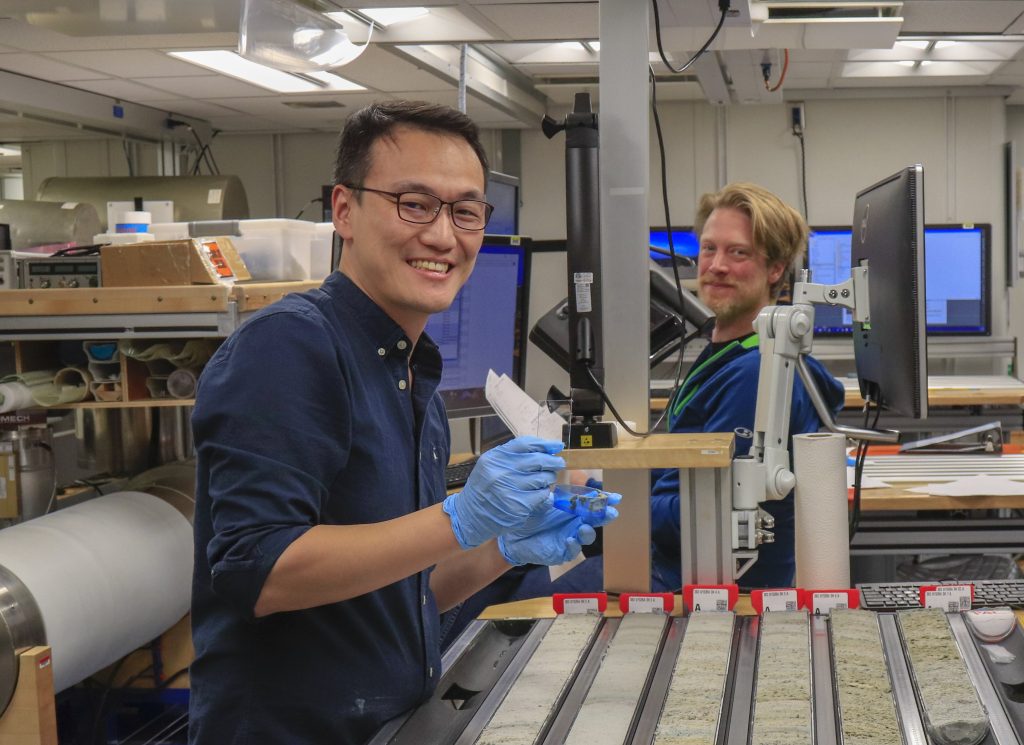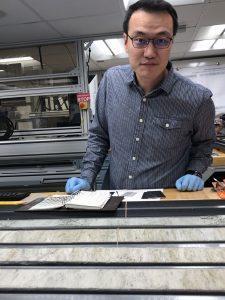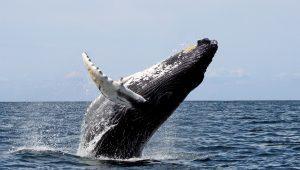
Career Spotlight: Sedimentologist Li Lo

Li Lo Interview
Please describe your job duties while on the JR. What will you be doing on a daily basis?
-
-
-
-
-
-
-
-
- I describe the lithology characteristic of sediments, take images and measure magnetic susceptibility of sediment, and prepare smear slides for lithology identifications. I also help other scientists set up the sampling plan for onboard analyses.
-
-
-
-
-
-
-
Describe one instrument or tool that is essential for you to do your job? Or a piece of equipment on the JR that is useful and why – what does it do?
-
-
-
-
-
-
-
-
- The Munsell color book. It is very important for sedimentologists to name the color of sediments in a scientific way. I rarely used it before. It is easy to say something is gray of brown, but the subtle color changes of sediments can be caused by multiple reasons. It is very important to describe the color in a more accurate way.
-
-
-
-
-
-
-
Why is your work (or research) important? What question are you trying to answer or how does your work/research help assist/advance scientific knowledge?
- As a sedimentologists onboard, we are the first team to describe details of the sediments from eyes and microscope. It is crucial for other onboard analyses and further onshore researches. As a researcher, I would like to reconstruct sea ice changes in the geological past across the Antarctic and Subantarctic frontal system using biomarker and element concentrations in the sediments. I have been studied sea ice changes in the subarctic Pacific for a few years, what we find there is the sea ice changes may reflect atmospheric energy budget from the Sun and greenhouse gases rather than sea surface temperature. I would like to see if there is any difference between north and south Pacific high latitude regions and what is/are the mechanism(s) behind this. I believe it is timely and crucial for the present day since we are experiencing differential sea ice changes in Arctic and Antarctic regions.

Why the ocean? What made you choose a career at sea or career that involves the ocean?
- The ocean posses the majority of heat, gas, and biological productivity in the Earth’s climate system. Also, it preserves continuous sediment records compared to the terrestrial environment.
What are you most excited about for this expedition and/or being on the JR?
- It is a great privilege to join in such a nice research cruise with great scientific and drilling teams. It is also a very exciting adventure to be in a very remote region of the ocean doing research.
What are three things you think are needed for a successful expedition at sea? And Why!
- Location! Location! Location! There are many places in the world that need to be studied. However, there are not many places that are easy to reach and are important in the Earth’s climate system. Thus, it is very important to choose where you should go.
If you could answer one question about our Earth – what would it be and why?
- How old is our Earth? I don’t know why but since I was a kid, I asked this question to myself many times.
What is your favorite sea creature and why?
- Whale! They are so big and so beautiful!

When did you know you wanted to pursue a career in science or an ocean science career?
- I wanted to be a scientist when I was in elementary school. I did not know what scientists really do, but I like the way that scientists work hard to solve something we don’t know.
What do you personally hope to gain or experience while on EXP383?
- I hope I could learn things from several aspects: 1. to learn how to generate a team for scientific drilling, 2. to learn how to collaborate with scientists from different disciplines, and 3. to get samples from climate-crucial regions for future research.
What message do you have for anyone considering a career at sea or a career involving the ocean sciences?
- We need you! The Earth needs you! There are many mysteries and unknowns that we need to know before it is too late.
What do you do back home when not on the JR?
- Spend time with family and prepare for teaching.
Do you get seasick? If yes or sometimes, please describe how you cope with it.
- Yes! Usually I need ~ 2 days to get used to the motion in the beginning. I take pills, sleep some more, and eat less. Pretty helpful.
The need for space comes in many forms. Which type of space, in general, is the most important to you? (Choose just one)
- _X_Personal Space
- ___Creative Space
- ___Outdoor Space
- ___Emotional Space
- ___Physical Space
- ___Spiritual or Meditative
- ___Outer Space
- ___Community Space
- ___Quite Space
- ___Productive/Work Space
- ___Digital/Virtual Space
- ___Public Space
- ___Inner Space
- ___Other:
Why that type of space? What makes it important to you and will it be available while on the JR?
- It is very important for me to get personal space after a 12-hr work day. I use my personal space to settle myself down and prepare for the next day’s work.